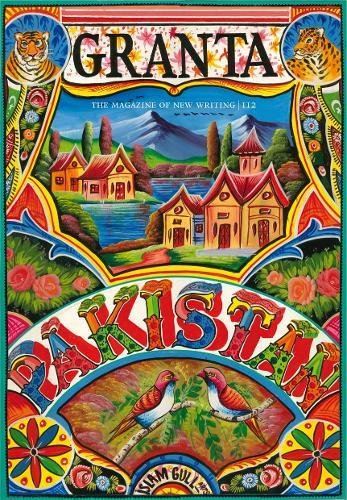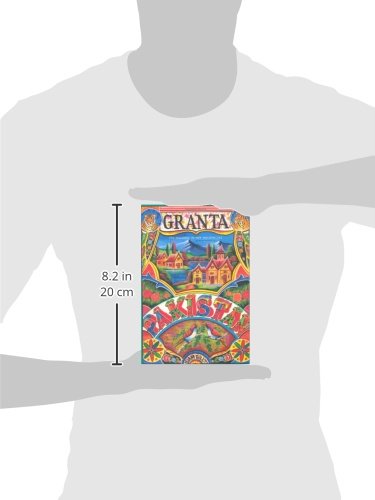Customer Services
Copyright © 2025 Desertcart Holdings Limited



Review Passionate and compelling, Granta 112: Pakistan offers an intelligent, inside look at a country we hear about every day, but remain ignorant of nonetheless. -- Republic of Brown, September 24, 2010More than anything else, Granta Pakistan is a warning against stereotyping a nation or losing sight of the many co-existing realities that make it what it is....[the pieces] are about using high-quality writing to probe the heart of a people and a culture, and to explore the often uneasy relationship between the two. -- Sunday Guardian, New Dehli, Sept 12, 2010Aslam's novella, "Leila in the Wilderness", one of the longest pieces in Granta's commissioning history which took the award-winning writer 15-years of rumination and rough drafts, is among the strongest offerings. Aslam manipulates the old subcontinental legend of star-crossed lovers, Leila and Qes, to dramatise the age-old prejudices towards the birth of girl babies that survive to this day in Pakistan. The result is spectacular, reminiscent of Angela Carter's feminist fairytales in The Bloody Chamber in its imaginative revisionism. He even employs magic realism to marry ancient legend with the post-9/11 politics of the here and now. --Independent, September 17, 2010Torn between the modern and medieval worlds, Pakistan is a painful place. The violence in these stories speaks of a new country struggling to be born. When it emerges, it may not be a pretty sight. -- Economist, September 16, 2010Some of the country's best-known writers appear alongside complete newcomers (one rookie is 79), and as they try to understand how it all went so wrong, the Islamization campaign of the military dictator Zia-ul-Haq in the 1980s lurks in the background.... For every bomb that goes off, there is an internal reaction. Call it creativity. Granta's anthology is a sure-footed portrait of this internal implosion. -- Wall Street Journal, September 24, 2010A stunning collection that makes a convincing case that Pakistan's writers cannot be missed. --The Daily Beast, September 24, 2010 About the Author John Freeman's criticism has appeared in the Guardian, The New York Times, and The Sydney Morning Herald. Between 2006 and 2008, he served as president of the National Book Critics Circle. His first book, The Tyranny of E-Mail, was published in 2009.
O**A
Amazing
Love Granta, and within this issue there are great Muslim writers
F**I
Highly Recommended
Granta's issue on Pakistan features all the major contemporary writers coming from Pakistan and others who have been based in Pakistan. These short stories, essays, poems are fantastic reads - I finished the book in one day. Definitely worth reading.
I**X
Engrossing
This edition of Granta is thought provoking and does encompass a wide range of perspectives.The writing is excellent and in particular the essay on collective identity and Jinnah is superb.The complex nature of contemporary Pakistan is reflected in these essays.Worth an investment of four or five hours of your time.
A**O
Five Stars
I've never dipped into a "Granta" I didn't enjoy.
R**E
Thought provoking insight into troubled country
Pakistan is a rich source for this collection, being as it is a cauldron of culture, history, religion, politics and beliefs. There is a striking difference here between the beauty of some of the fiction and the brutality of the non-fiction pieces.This edition of Granta kicks off with a cracking piece of short fiction from Nadeem Aslam about the tragedy of a young Muslim girl who is fated to only produce female heirs for her rich husband. It's shocking, moving and beautiful. Initially, Uzma Aslam Kahn's Ice Mating story didn't grab me, but as it switched between California and Pakistan, it unfolded to another interesting piece. Mohammed Hanif's shocking story of how not to woo a young nurse is both funny and sad. There are shocking moments of brutality in the non-fiction too - not least the short piece by Mohsin Hamid - A Beheading. More ancient tribal brutality is evident to Western eyes at least in Jamil Ahmad's The Sins of the Mother.Jane Perlez presents a brief but thoughtful piece on the intentions of Pakistan-founder Jinnah and wonders what he would have made of the ongoing Islamist movement that there is little evidence that he intended for the country. Basharat Peer's piece on the problems in Kashmir is also deeply moving, particularly emphasising the impact is has had on the youth that have never known any different. Intizar Hussain's short piece entitled The House of Gallows is enlightening while Declan Walsh, borrowing his title from Kippling, in Arithmetic on the Frontier explores the threat of the Taliban in the Northern frontier. Physical distance clearly helps analysis as there is equally insightful contribution from London-based Kamila Shamsie in Pop Idol.Of course it's hardly news that most if not all of Pakistan's problems stem from initially British imperialism attempting to create unity amongst disparate tribes, exacerbated by unforseen side effects of Western and particularly US foreign policy, not least of which the support of the Afghani resistance to the Russian invasion and the support of fundamental Islamist military power in the form of General Zia ul-Haq. What is equally clear though is that understanding the causes do little to identify the solution. There's a stark reminder of the impact of this on the West in Lorraine Adams' investigation of The Trials of Faisal Shahzad.There's poetry from, amongst others, Daniyal Mueenuddin although given the quality of his superb collection of short stories, In Other Rooms, Other Wonders, I was sorry not to see a short story from this highly talented writer. On the other hand, it is a reflection of the quality of writing that is coming out of this troubled country. Instead of Granta's traditional photographs, the edition is illustrated with sometimes interesting Pakistani art, much of it modern.
D**N
Near East
I am fascinated by the cultures of Pakistan, Afghanistan and India. The more I read the authors who live there and the westerners who have lived there, the better my understanding is of these faraway and mysterious, to us, people. As I read I am sure that all people of the world share a lot, love of family, need for respect and other necessities. However I also see that their are great differences, some obvious and others deeply rooted in the culture. This issue of Granta helped me gain in my knowledge and respect for them.
E**W
High Noon
Pakistan - how knowable, how understandable can a few articles, a few art installations, a few pieces of fiction make it? To the white western world it is impenetrable, other, alien. An understanding balances on some strange fretwork in this issue of Granta: the closest I can personally come to Pakistan is through it's art. But doesn't that art in itself balance on a fretwork of impenetrability? In his foreword to the artwork High Noon, Hari Kunzru falls with something like relief on a series of photographs by Imran Qureshi. Quite simply beautiful, it might stand for the competing morass around it as something to aim for - peace, beauty, the shadows of the sun on a peaceful image. The issue opens with a cruel, degrading short story of Pakistan as it was in the past, as many who live there would still want it to be. There is little here that would endear some of Pakistan's implacable traditions (rejection/murder of female children, absolute control over women, implacable hostility to female emancipation) to anyone in the west, including those who live here in Britain, or in America and other western or westernised countries. The Trials of Faisal Shahzad tells the story of a naturalised American, born in Pakistan, who drove an SUV loaded with explosive devices to the corner of 45th Street and Seventh Avenue in Times Square, New York. He began the detonation process and took a train back to his apartment. The article, by Lorraine Adams with Ayesha Nasir, tells us that he made a fundamental mistake. Not realising the detonator was set to react to military timing he set it for 7oclock. For it to go off before discovery it should have been set for 1900 hrs. If he had understood what he was doing he might have murdered tens, perhaps hundreds of people.Is it the worst kind of truism, I wonder, that the prevailing cultures of east and west push against and struggle with one another, and seem further than ever from coming to some kind of shared understanding of the world?
M**A
Granta 112
"I just wanted to tell you that I am reading 112 and I haven't been able to put it down for a minute I have alternated between despair, sadnessand resonance of the memories I have of Pakistan. Thank you to Granta to have put this together along with the series of events."
Trustpilot
4 days ago
3 weeks ago